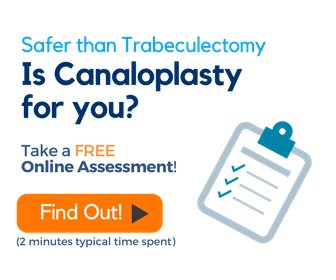Hi! My name is David Richardson. I’m an eye surgeon that specializes in cataract and glaucoma surgery.
The first video here is going to be on what I would call a holistic approach to glaucoma. Now, by holistic I don’t mean woowoo. I’m very much based in the scientific method when it comes to my recommendations for treating glaucoma. But I would say there’s a lot of misconceptions out there about glaucoma, both among patients and doctors. So by holistic, I really mean an overall approach– one that goes beyond just intraocular pressure. So shall we get driving?
So the first thing I’d like to talk about is the idea of pressure and glaucoma. Many people, including doctors, focus pretty much just on the pressure. The interesting thing is that the definition of glaucoma— if you look at certain references doesn’t even have intraocular pressure in it. And that’s because glaucoma is really a progressive optic neuropathy. That means they damage the optic nerve. It gets worse over time. Now it is pressure sensitive but pressure itself is only one of the components of glaucoma and we’re discovering that a major component is actually blood supply to the optic nerve.
There may be other issues as well such as types of mechanisms in the cellular level that result in destruction of the cells, oxidative damage…things like that. So when patients come to me for glaucoma treatment, I very much want to focus on not just the pressure but on these other very important things. And in particular point out how my patients can, themselves, address the many issues that are involved in glaucoma besides just pressure.
So what are those issues? Well, I mentioned blood supply. And it’s critically important that your cardiovascular health be good. So, for those with glaucoma or at risk of glaucoma:
- high blood pressure must be treated,
- sleep apnea must be treated,
- diabetes must be treated,
- cholesterol
All of these things are critically important because if you’re not getting good blood supply to your optic nerve, it doesn’t matter what I recommend in terms of lowering the pressure because any tissue or organ in the body that’s not getting good blood supply just isn’t going to work very well and it’s going to be damaged over time.
So what kind of things can you do other than making sure that you’re being treated for these conditions. Well anything that’s good for cardiovascular health…so, proper diet—making sure that you’re getting regular aerobic exercise…things like that. Now with the actual treatment of intraocular pressure it’s important that you are choosing medications that are going to be not only pressure lowering medications but are not going to worsen other conditions that tend to be present in the eye of those with glaucoma. For example, many people who have glaucoma are also at the age where they’re getting dry eye and the eye drops that are used for glaucoma can worsen dry eye. So again before we get to pressure lowering, it’s important that you also treat the other conditions of the eye that could get worse with glaucoma treatment. And dry eye, in particular.
So what what do I recommend for dry eye? well of course I recommend tear replacement therapy but preservative-free tear replacement therapy.
There is a preservative in many medications called Benzalkonium Chloride or BAK for short–present both in glaucoma medications as well as dry eye medications—so, artificial tears (although less so now in artificial tears…they’ve gotten away from using BAK). BAK is something that can actually worsen the condition of the ocular surface, make dry eye worse and, in particular, there’s evidence that with glaucoma (over time) it can actually damage the trabecular meshwork.
Now the trabecular meshwork is the drainage grate. It’s actually more than a grate there’s a pumping mechanism, there’s a feedback mechanism…(we can talk about that later on another drive perhaps but that’s if you’re not too annoyed by the glare that I’ve been annoyed by this particular drive). So, anyway, my point is that you want to avoid BAK, if you can because it can actually damage the drainage system in the eye. And if the drainage system in the eye is damaged then it’s likely that your pressure is going to go up. So that will work against any pressure lowering benefit that you’re getting from medications– laser surgery things like that.
Fortunately for me but unfortunately for these videos well maybe not depending on how much you’ve enjoyed or not enjoy this I have a really really good commute and I’m here at the office already. So I’m afraid we’re gonna have to continue this discussion about the holistic treatment of glaucoma as well as other discussions in the future, depending on how much you and I like doing this together all right well thanks for commuting with me and I hope you found this interesting and informative let me know if he did because I’m going to continue or not based on the kind of feedback that I’m getting from people.
Alright? Have a great day! Bye.
Related Articles:
- Today’s Dietitian | Holistic Nutrition: Complementary Glaucoma Therapies
- My Guidelines to Initiating Glaucoma Supplement Therapy
- Glaucoma Supplements To Discontinue (Or Continue) Around The Time of Eye Surgery
- Palmitoylethanolamide (PEA) Treatment For Normal Tension Glaucoma
- Luteolin turns on Genes that May Prevent Glaucomatous Damage

David Richardson, MD
Medical Director, San Marino Eye
David Richardson, M.D. is recognized as one of the top cataract and glaucoma surgeons in the US and is among an elite group of glaucoma surgeons in the country performing the highly specialized canaloplasty procedure. Morever, Dr. Richardson is one of only a few surgeons in the greater Los Angeles area that performs MicroPulse P3™ "Cyclophotocoagulation" (MP3) glaucoma laser surgery. Dr. Richardson graduated Magna Cum Laude from the University of Southern California and earned his Medical Degree from Harvard Medical School. He completed his ophthalmology residency at the LAC+USC Medical Center/ Doheny Eye Institute. Dr. Richardson is also an Ambassador of Glaucoma Research Foundation.


